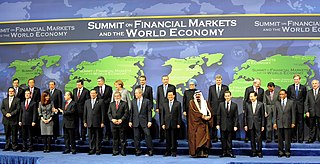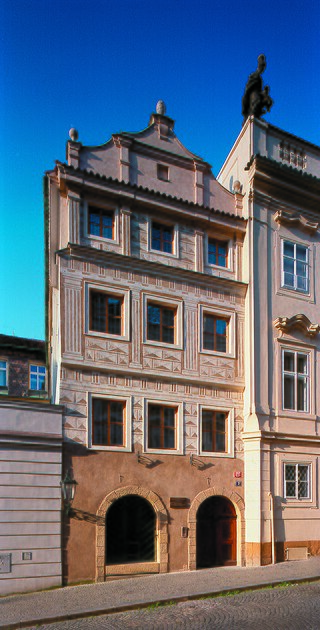
A think tank, or policy institute, is a research institute that performs research and advocacy concerning topics such as social policy, political strategy, economics, military, technology, and culture. Most think tanks are non-governmental organizations, but some are semi-autonomous agencies within government, and some are associated with particular political parties, businesses or the military. Think tanks are often funded by individual donations, with many also accepting government grants.
In international relations, power is defined in several different ways. Material definitions of state power emphasize economic and military power. Other definitions of power emphasize the ability to structure and constitute the nature of social relations between actors. Power is an attribute of particular actors in their interactions, as well as a social process that constitutes the social identities and capacities of actors.

A great power is a sovereign state that is recognized as having the ability and expertise to exert its influence on a global scale. Great powers characteristically possess military and economic strength, as well as diplomatic and soft power influence, which may cause middle or small powers to consider the great powers' opinions before taking actions of their own. International relations theorists have posited that great power status can be characterized into power capabilities, spatial aspects, and status dimensions.

In international relations, a middle power is a sovereign state that is not a great power nor a superpower, but still has large or moderate influence and international recognition.

Stockholm International Peace Research Institute (SIPRI) is an international institute based in Stockholm. It was founded in 1966 and provides data, analysis and recommendations for armed conflict, military expenditure and arms trade as well as disarmament and arms control. The research is based on open sources and is directed to decision-makers, researchers, media and the interested public.

The International Institute for Applied Systems Analysis (IIASA) is an independent international research institute located in Laxenburg, near Vienna in Austria, founded as an East-West scientific cooperation initiative during the Cold War. Through its research programs and initiatives, the institute conducts policy-oriented interdisciplinary research into issues too large or complex to be solved by a single country or academic discipline. These include climate change, energy security, population aging, and sustainable development. The results of IIASA research and the expertise of its researchers are made available to policymakers worldwide to help them make informed and evidence-based policies.

Moscow State Institute of International Relations (MGIMO) is an institute of higher education located in Moscow, Russia. The institute is run by the Russian Ministry of Foreign Affairs.

Japan is a great power and a member of numerous international organizations, including the United Nations, the OECD, and the Group of Seven. Although it has renounced its right to declare war, the country maintains Self-Defense Forces that rank as one of the world's strongest militaries. After World War II, Japan experienced record growth in an economic miracle, becoming the second-largest economy in the world by 1990. As of 2021, the country's economy is the third-largest by nominal GDP and the fourth-largest by PPP.

Swedish Association of International Affairs (SAIA) (Swedish: Utrikespolitiska Förbundet Sverige (UFS)) is an umbrella organization for the associations of international affairs that can be found in most of the major university cities in Sweden. It has a total of 9 member organizations, which have about 3,000 members in between themselves and organize about 350 events per year. The main focus of its member organizations is the furthering of debate of international issues at the respective universities through lectures with politicians, diplomats, academics, activists, and others.
The Westphalian system, also known as Westphalian sovereignty, is a principle in international law that each state has exclusive sovereignty over its territory. The principle developed in Europe after the Peace of Westphalia in 1648, based on the state theory of Jean Bodin and the natural law teachings of Hugo Grotius. It underlies the modern international system of sovereign states and is enshrined in the United Nations Charter, which states that "nothing ... shall authorize the United Nations to intervene in matters which are essentially within the domestic jurisdiction of any state."

The International Institute for Democracy and Electoral Assistance is an intergovernmental organization that works to support and strengthen democratic institutions and processes around the world, to develop sustainable, effective and legitimate democracies. It has regional offices in Europe, Latin America and the Caribbean, Asia and the Pacific and Africa and West Asia. The organization is headquartered in Stockholm, Sweden.
The Global Water Partnership (GWP) is an international network created to foster an integrated approach to water resources management (IWRM) and provide practical advice for sustainably managing water resources. It operates as a network, open to all organisations, including government institutions, agencies of the United Nations, bi- and multi-lateral development banks, professional associations, research institutions, non-governmental organisations, and the private sector.

The Graduate Institute of International and Development Studies, also known as the Geneva Graduate Institute, is a public-private, government-accredited postgraduate institution of higher education located in Geneva, Switzerland.
The European Policy Institutes Network (EPIN) is a network of 31 think tanks from most EU member states and beyond. Its main focus is on current EU and European political and policy debates. EPIN aims to contribute to the debate on the future of Europe through up to the minute, expert analysis and commentary and through providing easy access to understanding the different national debates. EPIN is coordinated by the Centre for European Policy Studies in Brussels, Belgium.

The Finnish Institute of International Affairs is an independent research institute that produces topical information and research on international relations and the European Union. It also publishes the journal Ulkopolitiikka. It is located in Helsinki.

The Institut Barcelona d'Estudis Internacionals (IBEI) is an interuniversity research institute and postgraduate education center located in Barcelona, established in 2004 as a joint initiative between the Barcelona Centre for International Affairs and five universities in the Barcelona metropolitan area, as a center of excellence in international studies. The President of the institute is Narcís Serra, former Minister of Defense and former Vice President of Spain, and the Director is Jacint Jordana, Professor of Political Science at the Pompeu Fabra University.

The Institute of International Relations Prague (IIR) is a public research institution that produces basic and applied scientific research in the field of international relations. Dr. Mats Braun is the director of the IIR. The founder of the IIR is the Ministry of Foreign Affairs of the Czech Republic (MFA). The activities of the IIR are financed from the government budget for science, research, and innovation of the Czech Republic, on the basis of horizontal cooperation with the Ministry of Foreign Affairs of the Czech Republic, from domestic and international projects, and by sales of its publications. The IIR carries out independent research in the public interest.

The Latvian Institute of International Affairs is a think tank in Latvia. Founded on May 20, 1992, the organization seeks to provide “Latvia's decision-makers, experts, and the wider public with analysis, recommendations, and information about international developments, regional security issues, and foreign policy strategy and choices”. They achieve this by publishing original research, hosting conferences, and partnering with other institutions in these tasks. Their research focuses on important topics such as Latvian foreign policy; transatlantic relations; European Union policies, including its neighborhood policy and Eastern Partnership; and multilateral and bilateral relations with Russia. The LIIA is a nonprofit and does not receive regular government funding. Its funding primarily comes from its partners for individual projects. While the LIIA is a non-governmental organization, they do advise the Latvian Parliament, as well as other decision-making bodies within and outside of Latvia. The current director (2011) of LIIA is Andris Sprūds.
The Stockholm Centre for Eastern European Studies is a non-profit organization based in Stockholm, Sweden, opened in 2020 by the Swedish Institute of International Affairs. At its foundation it was managed by Fredrik Löjdquist.













